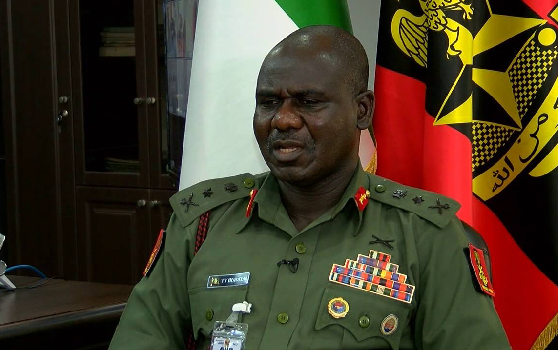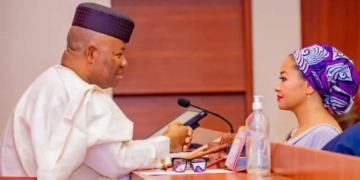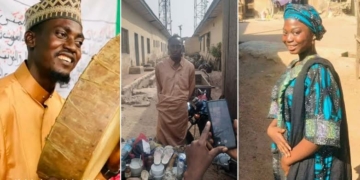By David Onmeje
“Innovation distinguishes between a leader and a follower.”- Steve Jobs– Famous American businessman and management theorist.
From time immemorial, the military institution of the Army has been ensconced in the norms of self-reliance, self-dependence and self-preservation in all corollaries. A typical Army formation anywhere in the world, exists as an embodiment of a small nation, something akin to a fiefdom in existentialism.
Any Army formation has everything it requires to exist and function professionally in its own isolated world, but actually an elaborate one in the real sense. The Army has its own professionals of all specializations; schools and hospitals. It romances the pleasures and intricacies of science and technology, through the invention and manufacture of its own warfare weapons.
The Nigerian Army was also conceptualized along such thoughts and operational frameworks. But years of leadership decadence in Nigeria and the concomitant pervasive degeneration in the country, sadly obviated these cherished values. The Nigerian Army became a ghost of itself, very noticeable in the importation of all its arms and ammunitions. Special Army schools of military engineering or technology, with mandate to propel warfare technologies were ruined and abandoned.
However, the preachments of the President Muhammadu Buhari’s administration, which de-emphasized a self-reliant economy, and attached premium on home-grown technology polity and the utilization of local content for goods and services. It offered a rewarding inspiration and window to the dynamic incumbent leadership of the Nigerian Army to harvest bountiful opportunities.
Nigeria has found itself in the age of bile, virulent and ravaging Boko Haram insurgency. And the current Chief of Army Staff (COAS) and chief armour bearer of counter-insurgency operations in Nigeria, Lt. Gen. Tukur Yusufu Buratai , who faced the extraordinary task of disfiguring the rage of terrorism on Nigeria had to adopt home-grown solutions to meet soldiers’ equipment and kitting requirements for combating insurgency.
It was the famed French warlord and politician, Napoleon Bonaparte, who extrapolated that “To extraordinary circumstance, we must apply extraordinary remedies.” So, in spite of the scary and consuming insecurity condition of Nigeria, Gen. Buratai sighted a solution only in reviving the Army’s revered culture of self-sustenance in meeting its needs for professional and operational convenience.
Gratifyingly, Gen. Buratai has raised a template of confounding innovations and restored the dissipated technological endowments of the Nigerian Army within four years. He never rendered himself to excuses, in exposition of failure to curb the threats posed by monstrous Boko Haram insurgents because ab initio, he resolutely resolved to fight and defeat the terrorists hands down. In his famed speech on assumption if office, he termed this resolve as the ‘promise.’
Again, Napoleon Bonaparte once counselled that “When you have resolved to fight a battle, collect your whole force. Dispense with nothing. A single battalion sometimes decides the day.” Like the Israeli experience in the ancient era of European persecution, Gen. Buratai devised ways of arming, equipping and kitting Nigerian soldiers, exploiting the sophistry of local technologies to make battles in the trenches a seamless exercise for Nigerian troops.
At the 2019 Chief of Army Staff Conference in Kaduna, Nigerians misgivings swept off their feet, President Muhammadu Buhari inclusive as Gen. Buratai’s exemplary leadership necessitated the exhibition of innovative and cutting-edge technological breakthroughs by the Nigerian Army. Gen. Buratai blazed the trail with home-grown solutions manifest in the exhibition of certified technological innovations. And the exhibitions included light weapons, Armoured Personnel Carriers and kitting, which three decades ago were fantasies to leadership of the Army.
The 2019 COAS confab climaxed with President Buhari, personally in attendance and commissioned the first batch of Nigerian Army’s locally manufactured Mines Resistant Ambush Protected (MRAP) nicknamed “Ezugwu” vehicles. MRAP was manufactured by military engineers at the Defence Industries Corporation of Nigeria, Command Engineering Deport (DICON/CED), Kakuri, Kaduna state. Its potency and relevance in sustaining Army’s clearance operations on Boko Haram in Nigeria’s Northeast and similar operations around the country is adjudged as superb.
An impressed President Buhari remarked commendably; “I salute the gallant efforts of the Nigerian Armed Forces in routing terrorists and combating insurgency in the on-going operations in the North East. This administration will continue to support the military to achieve its goals in addition to prioritizing their welfare and that of their families. ”
Visibly euphoric, the Chief of Defence Staff (CDS) Gen. Gabriel Olonisakin endearingly eulogized the leadership ingenuity of Gen. Buratai, as he crooned; “The decision of Nigerian army to explore the full potential within its ranks to come up with reputable innovations would be a boost to ongoing counter insurgency operations’ It is in this regard that I wish to recognize and also commend the sterling efforts of the Nigerian army under the dynamic leadership of the COAS Lt Gen TY Buratai.”
He further enthused; “I equally make bold to state that the Nigerian Army’s giant strides have opened up a new vista of opportunities for the country to become a global competitor in the manufacture of military hardware. Therefore, the proper harnessing of these efforts would help to facilitate the commercial production and sales of defence equipment and ultimately become a source of foreign exchange earnings for the nation. I am therefore proud to identify with the R & D efforts of the NA as I encourage its leadership to remain focused on this laudable objective.”
Even the critically insatiable Nigeria’s Minister of Defence Major General Bashir Magashi doffed his cap for President Buhari and the Nigerian Army; Magashi bowed in accolades to soldiers, “l salute the President for his continuous support to the Nigerian Army. The Federal Government would continue to support the military ahead of the final onslaught on Boko Haram in 2020. the Nigerian Army has had a hectic year with a lot of operations conducted to secure the territorial integrity of Nigeria.’’
It was indeed, Gen. Buratai’s glorious day of special honour. And the torrents of eulogies poured out endlessly, applauding his focused and result-oriented leadership of the Nigerian Army. Kaduna State Governor, Mallam Nasir el-Rufai thundered;
“I commend the Nigerian Army for their roles in sustaining peace and security in Kaduna State. They have restored peace and stability in Southern Kaduna; decimated the capacity of cattle rustlers and kidnappers operating in the state and its environs. The role played by the Army in confronting the menace of the outlawed ‘El-Zakzaky movement’, which had oppressed the people of Zaria for the last 30 years, as well as various corporate social responsibilities including medical outreaches and infrastructure interventions in Kaduna State is also appreciated.”
But the path to the transformation success narratives of the Nigerian Army under the leadership of Gen. Buratai have not been an easy chore. The Army boss has braved the odds because President Buhari bolstered him with words of inspiration and consistent support. Therefore, it was a uniquely rare platform for the Army Chief to extol the leadership disposition of his Commander-In-Chief, President Buhari thus;
“The current transformation of the Nigerian Army to its current status of a professional, highly-motivated, innovative and people-centric institution commenced in 2015 when the President was sworn in for his first term in office.”
Nevertheless, aside the breathtaking reality of MRAP, Gen. Buratai has registered similar successes in other sections on meeting operational requirements of the Army In November 2019, during Exercise Vulcan Glow VI of the Nigerian Army Corps of Artillery (NACA) at Kachia, Kaduna state, Nigerians were also acquainted with the giant strides in research and development by the corps.
Chinese war wizard, Sun Tzu once persuaded Army leaders to understand that “Those who are victorious, plan effectively and change decisively.” So, Gen. Buratai constantly keeps his binoculars on the future, with eyes fixated on what weapons the insurgency battle might demand the next day and leaves nothing to chance.
Therefore, NACA has also been goaded and empowered into breakthroughs in the re-modification of 105 MMObligation, 14Horwitzer and the 105 MM m56 drones and development of fire control computer applicationsequipment amongothers. These are great military fighting assets, assisting immensely in combating Boko Haram terrorism and allied insurgencies by Nigerian troops. Like in other instances, NACA Army engineers also sourced and utilized local materials for these technological innovations’, a rarity in the NA for decades.
And part of Gen. Buratai’s innovative legacies in his leadership includes deploying the use of technology to launch digitized uniforms for the Army. The security features of the uniforms includes transmitting signals to the nearest military base, anywhere the user is in distress or danger because it is inbuilt with sensors. This is enhancing the safety of troops in the frontlines battling terrorism in the rugged and complex terrains of Northeastern Nigeria.
The establishment of the Human Rights Desk in Army Headquarters’ (AHQs) to resolve unpredicted incidents of human rights violations of Nigerians in the course of special assignments by soldiers; and also, the Army’s novel response to the practice of Corporate Social Responsibility (CSR) invokes fond memories of Gen. Buratai’s leadership. Under Gen. Buratai, countless host communities across Nigeria are beneficiaries of the Army’s CSR projects in virtually all sectors of social/infrastructural amenities.
Collin Powell reasoned that “Perpetual optimism is a force multiplier.” Gen. Buratai is optimistic of a final victory against Boko Haram. But ultimately, he believes like Albert Einstein that, “May the conscience and the common sense of the peoples be awakened, so that we may reach a new stage in the life of nations, where people will look back on war as an incomprehensible aberration of their forefathers!,” which is the underlying philosophy of his “stick and carrot,” principle, in itself, an innovative approach to counter-insurgency.




Discussion about this post